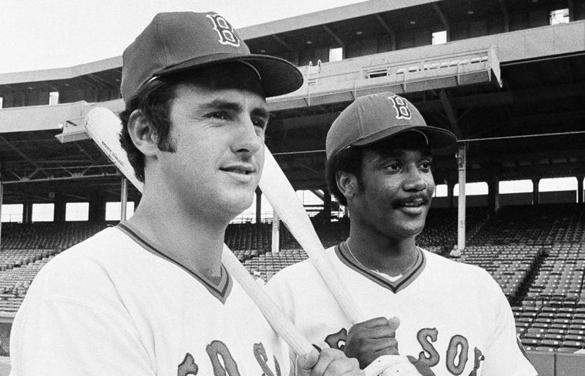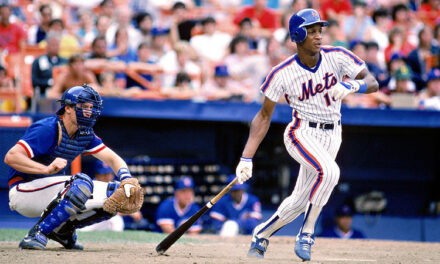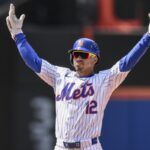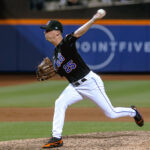
Boston Herald
Fred Lynn’s early success in the major leagues had many thinking he was on a Hall of Fame trajectory.
Lynn’s meteoric rise from a three-time collegiate champion at the University of Southern California, to winning both the A.L. Rookie of the Year and M.V.P. Awards in 1975 – the first player to take home both pieces of hardware in the same season – made him in an instant fan favorite.
Lynn, 66, played seventeen seasons in the majors, best known for his seven years spent with the Boston Red Sox from 1974-80.
Lynn embraced the college vibe Boston exuded, as many of the key contributors on the Sox were in their mid-to-late twenties at a time when the club was routinely fielding a competitive team.
Along with his impressive play during the regular season, Lynn seemed to always come through big in the bright lights of each year’s All-Star Game, one in which Lynn made nine straight seasons (1975-83).
The competition and desire to win the game was heightened back then, with each league having its own president and with interleague play only occurring during spring training, the Midsummer Classic and the World Series.
Lynn thrived off the competition, wanting to showcase his talent against some of the game’s very best. Among the all-time leaders, Flynn is fifth in slugging percentage (.900), fourth in OPS (1.264), tied with Ted Williams for the second-most home runs (4), and tied with Stan Musial for the second most RBIs (10). He also holds the distinction of hitting the first and still only All-Star Game grand slam, taking lefty Atlee Hammaker deep to right field in the third inning in the 1983 exhibition.
After leaving the Red Sox via trade in 1981, Lynn would play another ten seasons with the California Angels, Baltimore Orioles, Detroit Tigers and San Diego Padres. However, injuries cost Lynn plenty of playing time, as from 1981-90 he averaged just 114 games per season. A host of injury issues afflicted Lynn, including cracked ribs, a broken toe, hamstring issues and several knee operations.
The lost playing time did Lynn no favors when it came to helping his Hall of Fame prospects. Despite the injury woes, Lynn carved out an impressive major league career, amassing over 1,900 hits, 388 doubles, 306 home runs and a .360 career on-base percentage.
Identifying with the Red Sox is an easy choice for Lynn, as he remains involved with the organization, each year making trips to Boston and hosting their corporate clients in luxury suites. Among all-time Red Sox players, Lynn is 7th in slugging percentage (.520), 7th in OPS (.902) and 10th in Win Probability Added (18.4).
I had the privilege of interviewing Lynn in early March, where we discussed his U.S.C. career, winning both the Rookie of the Year and MVP Awards in 1975 and how he views his legacy.

MMO: Who were some of your favorite players growing up?
Lynn: I grew up on the West Coast and we didn’t get to see all of the players all the time. I never got to see Mickey Mantle play, if I had, I probably would’ve thought he was a pretty cool player to watch or emulate.
Because I was in the West, I did get to see Willie Mays and Roberto Clemente. I used to go back and visit my grandparents in Chicago and I got to see them play a number of times there. Those two guys were just great to watch; they could do everything. They had no holes in their game and they looked like they were having fun when they were playing and that’s one of the things that I tried to emulate as a kid and as a player; just have fun when you’re doing it.
MMO: Who introduced you to the game at a young age?
Lynn: That would be my dad. I think we started in the backyard, I was probably four or five-years-old and he was tossing me balls. In fact, this is the way he prepared me for not being afraid of a baseball: He bounced it off my head.
He goes, “Hey, did that hurt?”
I’m rubbing my head and going, ‘Well, that didn’t feel great.’
He goes, “It didn’t kill you, right?”
I said, ‘No.’
I didn’t do that with my son by the way. [Laughs.] But that was kind of my introduction to not being afraid [of the ball].
We did backyard stuff when I was a little guy and I didn’t even start playing organized ball until I was ten.
That’s unheard of in today’s world where my grandson – he’s eight – and he’s been playing ball for two years already! Kids today are getting a head start on guys my age.
I remember when I was nine you could sign up for Little League, and that year my dad said, “Well, you’ve got to go back to the Chicago area and visit all of your relatives.”
So I didn’t play baseball until I was ten. You can still have a pretty successful amateur career even though you start late.
MMO: You were originally recruited to play football for the University of Southern California (U.S.C.) and you did so in your freshman year. At what point did you realize that baseball was your true calling?
Lynn: It was kind of shown to me in the summer after my freshman season at U.S.C.
At the University of Southern California, when I went there in the fall of ’70, freshmen couldn’t play varsity football. Lynn Swann was my teammate and Sam Cunningham was on that team, so we had our own team. We would practice with the varsity and John McKay was the head coach then.
I had a pretty successful season on the freshmen team, but in baseball, it was the second year that freshmen could play varsity. And so I did. I made the team as a freshman and we won the College World Series. I was on the All-Tournament team as a freshman, and then after that was concluded in June there was a tryout for the Pan-Am team. I went down to Florida and I made that squad. This is a team representing the U.S. and we kind of barnstormed the Eastern Seaboard for about thirty days to kind of gel as a unit before we went down there. I was really playing well.
We lost to Cuba in the gold medal game and I led the tournament in home runs as a skinny nineteen-year-old. We had four coaches that were just on me all summer, “Why are you going to play football? Are you crazy? This is what you’re supposed to do.”
It kind of wore me down really. I could see the handwriting on the wall that, as a freshman, I was one of the best amateur players in the country. I came back that summer and that’s when I decided to not play football anymore.
MMO: While you attended U.S.C. you went on to win three-straight College World Series championships (1971, ’72, ’73). How did the success at college help prepare you for the majors?
Lynn: It helped me a lot, it really did. Had I not gone to U.S.C. there’s no way that I would’ve done the things that I did as a rookie in Boston. I wouldn’t have been equipped for it, mentally or physically.
Because I went to U.S.C. and we were so successful, we’re playing the best teams all the time and then we win three consecutive championships like we did, you learn a lot about yourself and what it takes to win. What it’s like to be on a winning atmosphere and a winning team.
Plus, not only was I representing the U.S. my freshman year, but also my sophomore year I went to Japan and played U.S.A. versus the collegiate Japanese All-Stars. Both there and here so three times I represented the United States.
My amateur career was pretty successful, but back then no one knew about it. When I signed professionally, no one knew at the time that I did all of these things except maybe a couple of scouts. There was no publicity about it, so I just snuck up on the major leagues and that was a great background for me to sign professionally and be pretty successful right away.
MMO: Leading up to the 1973 Draft, did you have any notions that the Red Sox were looking to select you in the second round (41st overall)?
Lynn: That’s a great question. No. [Laughs.]
I’ve been scouted since I was sixteen and then the first draft out of high school, the Yankees selected me. I had a lot of scouts around me from the time I was sixteen onward and none of them were the Red Sox that I could see.
Obviously, they were there. In fact, some of the ex-players that I became friends with like Frank Malzone, he scouted me in high school. But they never said anything, they were just kind of behind the scenes.
It was just really the Dodgers and Orioles, those were the clubs that had great interest and showed great interest. And because I was a U.S.C. guy, everyone thought I was going to be drafted by the Dodgers; I’m right in their backyard for Pete’s sake. That’s where we thought I was going to be drafted and then the Red Sox kind of came out of nowhere.
I talked to my coach Rod Dedeaux at U.S.C. about it, because I didn’t know anything about the Red Sox. I knew they were a good club and I knew about Yaz, but that was about it. He said they were a quality organization and my time is now. I signed after my junior year with Boston.

MMO: You and Jim Rice – “The Gold Dust Twins” – were teammates in the minor leagues in 1973 and ’74. You both debuted in the majors in ’74, and along with Dwight Evans became one of the best outfields. What made your relationship with Rice so special?
Lynn: I think because we started off together at such a young age, we were in Double-A together as well. When I signed – I didn’t sign until late July, which is unheard of because the Draft is in June – I asked the Red Sox if I could play on this U.S.A. team in the summer of ’73, instead of signing and going to wherever. They said, “Yeah, go ahead.”
I did that and then I went to Bristol, Connecticut, after that, around late July. Jimmy was already tearing it up there, I was twenty-one and he was twenty.
We formed this bond. He’s in left and I’m in center, there’s a communication right there. If he would’ve played say in the infield, I don’t know if we would’ve been quite as tight, but because we were right next to each other all the time and we hit three-four in the lineup, that was a serious bond. And we were both kids, so yeah, I’ve known Jimmy, let’s just say a lot of years now.
We go way back and then we went to Triple-A together and again, it’s left-field/center field and three-four in the lineup. And that didn’t even change when we got to Boston; we hit three-four again. It was quite a bonding experience and we’re always linked just because of that.
MMO: Do you know where the “Gold Dust” nickname originated from?
Lynn: It came through the press somewhere. I didn’t read the papers very much. You’re hearing things said about you enough and whatnot. There was a contest, maybe?
I never did find out exactly who coined that phrase or where it came from, but it sure stuck. It was fun. And now, every time I see him he’ll go, “Hey twin, how you doing?” Every time we see each other it’s like we go back in a time machine. We just kind of fall back to when we were kids, basically.
MMO: Obviously, your 1975 season was sensational, leading the A.L. in slugging, OPS, runs scored and doubles. You also became the first player to win both the Rookie of the Year and MVP Awards in the same season. What made that year so special for you?
Lynn: Back then, as I said earlier, you could kind of sneak up on the league. For me, I was a very shy guy, and so was Jimmy. We were getting some press in Boston, but it wasn’t the kind of thing that was overpowering like it would be today. We were just kind of worried about doing a good job and having the team win, and that was my goal.
What made the season special for me was that we made the World Series. What made it tough is that we lost [it]. I never lost a championship game before when I was in one. If we win the whole thing my first year I could’ve retired and gone to football! [Laughs.] How great would that be? You win all of those awards, your team wins in the first year and then you said, ‘Nah, this is good. I’m going to go somewhere else now.’
It was fun, not only because of Jimmy and me, but it was a whole core of young guys in the club. You had Billy [Lee], Rick Burleson, Timmy Blackwell; there was a bunch of guys that were great and we all hung together, five or six of us. It wasn’t just focused on myself or Jimmy or one particular guy because there were so many of us that were young, under 25 years old. It was like the kiddie core and the veterans.
I think it was really fun for the people to watch us, especially the college kids because Boston’s a college town. Back then they could just get in for like two bucks! So we were identified with them because we were the same age as all of these guys and gals. It made it fun for us to have this kind of following and, for me personally, it was a fun year. It wasn’t trying to win those awards or anything like that, it was trying to win, and that was the biggest disappointment that we lost Game 7.
MMO: The ’75 World Series is considered one of the best Fall Classics, with MLB Network airing a special on that Series. Can you talk a little about that World Series against the Reds?
Lynn: By the time we got to the World Series, we swept the Oakland A’s, the defending champs. We were a force to be reckoned with even though we didn’t have Jim Rice. I’m going to throw that out there right now: if we have Jimmy I think we win that series in six games. We had a couple of guys try to replace Jim, but he’s just not replaceable, they didn’t do very well. So we lost our number four-hitter. That would be like taking [Johnny] Bench out of their lineup or Tony Perez. You think they’re going to beat us without one of those two guys? No, they’re not.
Having said that, it was kind of like an extension of the season for me. As a rookie, back then, there was a book on pitchers and players but you never saw them. As a rookie, you’re seeing everything for the first time.
So, okay, it’s the Big Red Machine, who did they have? Don Gullet, what’s he got? And you’re seeing him for the first time. It’s not like today where players have already seen the other team by the time they get to the World Series because of interleague play and those kinds of things. Not back then. We had an idea of what these guys could do, but we never saw them. The learning curve is sped up because you only have a few games to compete. Every game was just back-and-forth, back-and-forth.
That key game in Cincinnati where the Ed Armbrister interference with Pudge, was a big play in that game and we ended up losing that game by a run. Larry Barnett was the umpire back then and every time he umpired in Boston, “Boo!” They had to have an armed guard when he came back to umpire in Boston. [Laughs.]
It was close all the way, we lost Game 7, 4-3, on a bloop single into center and it was hard for me to take. Like I said, I never lost a championship game before, so this was the first time I ever was in the other locker room. And boy, it just felt terrible. I still have dreams about some of those plays that could’ve changed the way the Series went. It hung with me for quite a while. In fact, it still does.
It was a great Series, and like you said, MLB Network did a full show just on Game 6, which was a fantastic game to be a part of. I’m proud to have been a part of that game and that Series. But boy, I sure wish it went the other way.
MMO: In Game 6, you put the Sox on top early in the 1st with a 3-run home run off Gary Nolan to right-center field. And then, in the bottom of the 12th, with the game tied at 6-6, you were on the on-deck circle as Carlton Fisk was at-bat against Pat Darcy. Can you talk about both of those moments?
Lynn: Sure, let me just set up Game 6. Obviously, we have to win. We’re down 3-2. We had three straight days off because of rain in Boston. We didn’t go to the field, I mean, it was a swamp and it was delayed. Game 6 should’ve been on a Saturday and Game 7 on Sunday, that’s the way it always worked out.
Well, it got pushed back, and back and back. So now we’re mid-week, and people are going to work. I remember my dad had to go back home because he had to go to work, so it was a really weird atmosphere. Just sitting around doing nothing waiting for Game 6.
We get a couple of guys on in the first inning, and to be honest with you, by the time Game 6 rolls around I’m probably about 170 pounds, I’m down to nothing. The second half of the season I kind of lost my power, still hit for average and stuff, but I hadn’t hit a ball as far as I hit that one probably since June.
When I hit it I said, ‘Oh, man!’ It went twenty rows past the bullpen. I don’t know where that came from, probably just adrenaline and just sitting around for three days, maybe just got some extra strength. I don’t know. But the place went bonkers. It was a great start for us because it got the crowd into it right away.
They come back and tie it up. We’re coming to the twelth inning and we’re watching Pat Darcy warm up. And Pudge goes, “I’m going to hit one off the wall and you drive me in.”
Well, he hogged the whole spotlight himself! [Laughs.] I had a perfect view because back then the on-deck circle was pretty close to the plate. I would always cheat a little bit to get closer to the plate so I could see the movement of the baseball for the pitcher. When he hit it I’m kind of leaning and I knew it had the length and it just hooked right in there and I did a big leap. I jumped higher than Pudge.
It was a fantastic moment. The place just went crazy and I, to a man, I think having won that game in the dramatic fashion that we did, I think everybody thought we would win Game 7. What’s interesting is the game ended, let’s say at 12:15, which is really the next day, we come back and play two games in one day. [Laughs.]
MMO: How difficult was it for you to leave Boston in a trade after the 1980 season?
Lynn: Yeah, that was hard. That whole deal with Carlton Fisk, Rick Burleson and myself. I’ll say this about playing in the ’70s and ’80s: it was a pretty contentious time between players and ownership. Free agency was just coming into play and owners didn’t want to pay guys. You didn’t just walk up to the owner’s office. In fact, I had only met Mr. Yawkey one time.
It was never a buddy-buddy thing, no matter where you played. It just looked like they wanted to get rid of us, for whatever reason. It was hard for me even though I was traded to the West Coast and the California Angels, and kind of going home so to speak.
I didn’t want to leave Boston. I mean, I hit .350 in that park! I’m a college guy and .350 kind of resonates with me and I tailored my swing for that park.
It was a big adjustment when I was traded away. It takes something out of you when you’re traded. Innocence is gone, let’s just put it that way. And then it just becomes, well okay, this is obviously a business. And you know what it is? Your brain tells you that it is, but you have this feeling that this is the team that drafted me and brought me up. So when something like that happens, it took me a while to get used to that.
MMO: Many baseball writers have said that if you had played your whole career in Boston, you were a likely Hall of Famer. Do you ever think about that and what are your thoughts on that statement?
Lynn: Many people have said that to me and it’s probably true. I obviously hit pretty well in that ballpark. I’m a competitive guy and I want my teams to do well and that’s what drives me, not individual statistics. I never really cared for that stuff that much; it was more about what the team did.
But the Red Sox were always competitive and it was fun to play there. We’re playing the Yankees and there’s lots of energy. I missed that energy when I went somewhere else, it was never quite the same.
All of those things you get post-career or post-seasons, those things they just kind of came. I never strived for them, it was not a goal. I played with guys and their goal was to be in the Hall of Fame from day one. And I used to kind of look at them like, ‘Okay.’
That wasn’t my deal. But yeah, if I’m with the Red Sox, I think Jimmy [Rice] and I go in together.

Associated Press
MMO: You were selected to nine straight All-Star Games, and have some tremendous accomplishments from them. Among all-time leaders, you have the fourth-highest OPS in the All-Star Game (1.264), you’re tied with Ted Williams for the second-most home runs (4), tied with Stan Musial for second-most RBIs (10), and you hit the first and still only grand slam in All-Star Game history.
What about that game made the best in you come out?
Lynn: That’s a good question and I appreciate you asking it. To me, that was one of the pinnacles of the season.
I loved playing on the big stage and playing against the best players. That’s what drives me. I wanted to face Steve Carlton; I wanted to face Tom Seaver. I wanted to face the best of the best and okay, I’ll see what I have here. I wanted to compete there.
This is when it was National League/American League. It wasn’t homogenized like it is now where it’s just under the umbrella of MLB. We had our own umpires, our own president, baseballs, and the strike zones were different in the leagues. When we played them we’re the junior league, we want to beat these guys.
I used to get calls from our league president, “Freddy, we need to beat these guys this year,” trying to pump the players up.
I didn’t need that. I went in there and I’m trying to do the best I can. If I’m going to take someone out at second base, I’m going to do that.
For me, it was one of the high points of the year, and I concentrated a lot. I wasn’t giving away anything and when you’re facing a potential Hall of Famer, like Seaver or someone like that, in front of 60,000 people, that’s fun. I enjoyed it.
Consequently, my games were kind of elevated when I played in those things.
MMO: I’ve read and listened to past interviews you’ve conducted, and you always highlight your defensive abilities as one of your defining qualities. How much pride did you put into the effort and commitment to being a defensive-minded player?
Lynn: You hit it right on the head, defense is effort. I played multiple sports throughout my life, I was a basketball player and a football player, obviously. I was a defensive back in football and a point guard in basketball, so you have all of these drills that you do for footwork.
When I got to play baseball, I already knew the footwork and how to do it. It just came second nature because these are things I learned as a kid, and I knew how to take routes to the ball because that’s football. And cut off guys that are ahead of you and all of these kinds of things just kind of play into playing center field.
I’m an aggressive guy. I always guarded the other team’s best player and I wanted to do the best out there. I didn’t want anything falling in my area whether or not I was going to hit a wall –which wasn’t padded then – or any other thing. I took a lot of pride in it.
That kind of stuff takes a lot of mental energy, because on every pitch you’re moving, you’re already moving. It takes a lot of energy to do that and over the course of 162 games, that’s where it wears you down. That mental energy and mental fatigue, sometimes it’s physical, but a lot of times it’s mental, too.
I really enjoyed playing in Yankee Stadium in front of 60,000 hostiles making the stadium go quiet with a defensive play. You know you can’t take something away from their offense, that’s very deflating. I just love that feeling.
MMO: When you look back on your career, what are you most proud of?
Lynn: I think the fact that people appreciated my style of play. They all knew that I got banged up and part of the reason was because of my style of play. I played for a bunch of different managers – some are Hall of Famers – and they’d say, “Hey, quit running into those walls. We need your bat in the lineup.”
And I’d say, ‘Yeah, okay.’
Then the game would start and if I can catch the ball I’m going to catch it.
People remember those things. You remember a big hit or big home run I might’ve had at the plate, but everyone remembers the defensive plays. Going over the fence or throwing someone out and people come up to me and that’s very gratifying.
I knew I put a lot of effort into playing defense, and people appreciated that. So that’s what I take away from my career the most actually.
MMO: Who were some of the toughest pitchers you faced in your career?
Lynn: Well, that’s easy for me, one would be Frank Tanana. When he was with the California Angels in the mid-70s, I don’t know if he was a rookie when I was a rookie, but it was pretty close. They had Nolan Ryan and Tanana, their two big horses. Nolan was striking out 320 guys a year and Frankie was like 280. He’s a lefty, about six-foot-two, and he had four different pitches whereas Ryan only had two and he was right-handed, so I saw him a little bit better.
I just never picked the ball up against Frank. Even if I squared one up once in a while, they’d catch it. I’ll give you an example: ’75 we went out there, and we’ve got a pretty good club. He strikes out 17 of us and he strikes me out three times, which was a first for me. I didn’t even foul one off! [Laughs.] Okay, this is a tough night, we have two hits and he struck out 17. Didn’t matter what he was throwing, he was tough on me.
MMO: A foundation you and your wife are heavily involved in is the FACE Foundation. Can you talk a little about how you got involved, and what the charity is about?
Lynn: This is a foundation that’s strictly in San Diego, and my wife found out about it through a friend. It’s a foundation for animal care and education. It provides grants for pet owners who have critically ill or injured animals and they’re unable to pay for it, the cost of the treatment.
What this organization does is it keeps pets from being euthanized. Since its conception a few years back, we’ve saved over 2,000 animals, so that’s really cool. Especially in a military-based area, a lot of these families are military and everyone that’s ever had a pet in their lifetime when it’s time for that pet to pass on that’s a big deal. If you can save a pet from going through that, it lights up your family. So it’s an organization that we’re deeply involved with.
MMO: How involved are you with the current game?
Lynn: I go back to Boston probably four times a year. They have a skybox there and I host it for corporate clients and do that. I probably see fifteen or sixteen games with the Sox. I still watch, I try to keep tabs with what’s going on. I worked at ESPN and CBS as an analyst after my playing career, so I look at the game a little differently than most. I try to keep up with what’s going on and the new players.
I don’t know all of the statistics; it takes me an hour now to read the box score because I don’t know all of the stats with the Bill James stuff and WAR. But just watching the players, and I always watch the center fielders, it’s what I do. I watch them to see if they’re getting a jump on the ball and I watch for the little things that I know about that most people won’t watch for.
It’s fun for me, I still enjoy the game. It’s changed a lot. Maybe we’ll do another show on that which would take about an hour. Having said all of those things, I still love the game. I think you can hear it in my voice, I’m still a fan of the game and I wish I could play it still.
MMO: Congratulations on being inducted into the Pawtucket Red Sox Hall of Fame this summer. That’s a great accomplishment, and something I’m sure you’re very proud of.
Lynn: Thank you! The funny thing about Minor League Baseball is you don’t want to be there very long! [Laughs.] Your goal is to get to the major leagues as quickly as possible. It’s sometimes a brief stint, other times it’s longer.
I have a lot of fond memories from playing with the Paw Sox. I’m very honored that they’re inducting me into their Hall of Fame.
MMO: I can’t thank you enough for your time today, Mr. Lynn. Thank you for sharing some great insight and memories from your wonderful career.
Lynn: Thanks very much, Mat.
Follow Fred Lynn on Twitter, @19fredlynn















